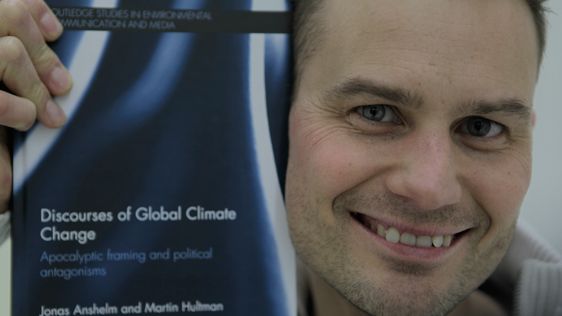
Press release -
Apocalyptic framing enable a discussion of Global Climate Change
Man made emissions of climate threatening greenhouse gases are changing our living conditions around the globe. Martin Hultman, Technology and Environmental Historian, Umeå University and Jonas Anshelm researcher at the Department of Technology and Social Change, Linköping University, are the author’s behind a new book: Discourses of Global Climate Change.
Martin Hultman says that they wrote the book because we live in a time when man made emissions of climate threatening greenhouse gases are changing our living conditions around the globe. How this insight should be understood and how it should be handled is undergoing profound and necessary political discussion throughout society.
– The debate may seem chaotic and unstructured for someone who is in the middle of it. We saw a need to understand the climate debate when it was at its peak and stakeholder positions with in it, said Martin Hultman.
What would you say is the essence of what you’ve come up with after working with the book?
– In the climate debate are mainly four different positions with a whole package of values associated with those positions. The Industrial-fatalistic position dominates and the Green Keynesian consists a group of players who also have great influence.
– Both of these clusters of ideology and opinion, share a common perception that green growth is necessary. Criticism of these come from an eco-socialist discourse, that takes climate scientific results seriously and argue for the need for a shift in the form of resource location, decentralization and small scale renewable energy.
– Criticism also comes from a climate skeptic collection of stakeholders, almost only older men, who believe that human induced climate change is not happening.
Is there anything that has surprised you when analyzing these issues?
– Two important results are that the apocalyptic description of climate change contributes positively to enable citizens and politicians, and that the environmental movement's commitment to raise the issue in aspects of environmental justice, in the climate debate, especially around the Copenhagen meeting in 2009.
– Both of these results are the opposite of how many other researchers described the climate policies in recent years.
What consequences would you like see due to what you’ve written?
– Awareness that climate change, as a critical issue of our time, was shared by all political parties and all organizations in Sweden around 2008. To identify and preserve a discussion as we have done, provides the opportunity to go back and the accountability of all those people in leadership positions who actually have the knowledge but not acted in line with their knowledge.
– I wish that both the environmental movement's role, in highlighting this issue, and that the book review and activate our memories of how the climate should be discussed as a pervasive social issue.
Contacts:
Martin Hultman, martin.hultman@umu.se, tel. +46 73-639 46 96
Topics
Categories
Umeå University
Umeå University is one of Sweden's largest institutions of higher learning with over 32,000 students and 4,200 employees. We have a well-established international research profile and a broad range of study options. Our campus constitutes an inspiring environment that encourages interdisciplinary meetings - between students, researchers, teachers and external stakeholders. Through collaboration with other members of society, we contribute to the development and strengthen the quality of our research and education.

